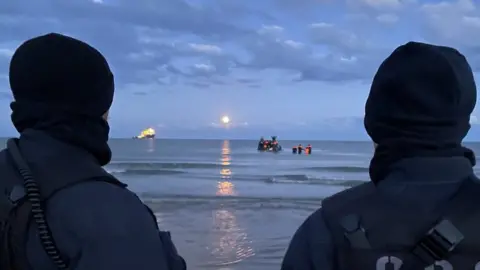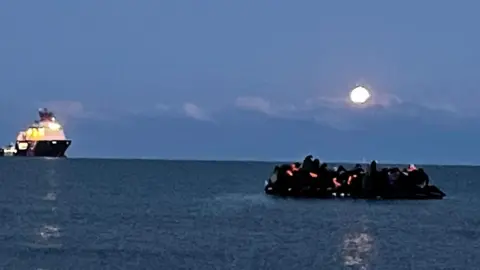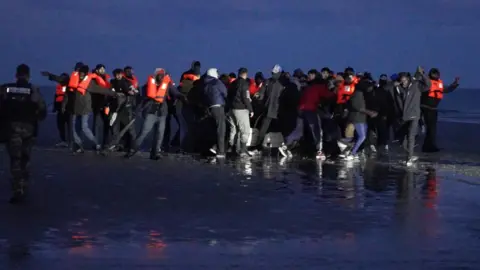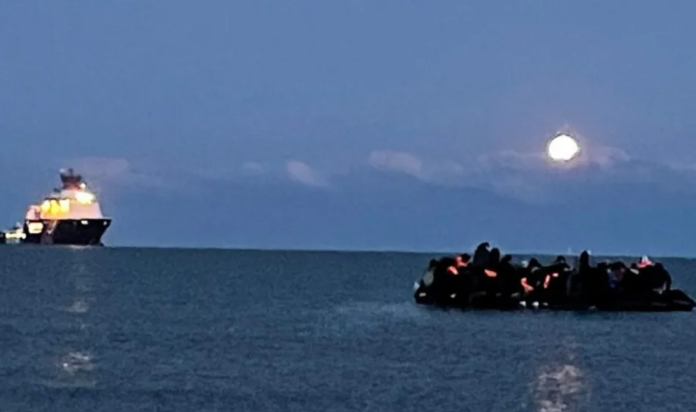It started with a shout in the dark.
A French policeman had spotted a mass of people moving from the sand dunes overlooking the English Channel near the resort town of Wimereux. Seconds later, the entire beach seemed to erupt into chaos.
More than a dozen policemen were now running across the sand towards the shoreline, hoping to intercept two groups of migrants who were now visible in the moonlight.
We could see young men dragging an inflatable boat towards the sea, and several women struggling to keep up with the group, and then bursting into tears as they realized they would be intercepted by the police.
As the converging groups of migrants gathered by the water’s edge, the scene turned suddenly violent. Several men threw fireworks towards the police. There were skirmishes and loud explosions, and white smoke drifted across the beach.
The crowd clustered around the inflatable boat, seeking to protect it from the police. At least two men circled the group, wielding large sticks or rods and appearing to threaten the police with them.
Barely two minutes had passed, but already the boat was in shallow water and people started to clamber aboard.
“What else could we do?” said a police officer at the scene.
 Paul Pradier | Once they were in the sea, police made no attempt to stop people
Paul Pradier | Once they were in the sea, police made no attempt to stop people
“We’re not allowed (to follow them) into the sea. And you notice they had sticks. And there were children there too. So we had to be careful.”
The police made one arrest of a suspected smuggler, and several people waded ashore having failed to find space on the boat.
There were early indications of trouble on board. We could hear shouting and jostling.
A child in a pink anorak was perched on someone’s shoulders as they stood in the middle of the boat. It was clear that there were far too many people attempting to fit on the boat.
Some were clinging to the edges. Usually, the maximum number of migrants attempting to fit on such a boat is around 60, but with two groups merging on the beach, that number was now over 100.
 BBC News | The overcrowded inflatable boat heads out to sea in the English Channel
BBC News | The overcrowded inflatable boat heads out to sea in the English Channel
“I want to get to England, to my family,” said an Iraqi man who was standing, despairingly, on the shore with two women, having given up any hope of clambering aboard.
Slowly, the boat drifted out to sea, briefly appearing to run aground on a sandbank. The police and those who had failed to get a place began walking back towards the dunes and a nearby carpark as the approaching dawn turned the clouds to the east bright pink.
At this stage, it was not clear to anyone ashore how bad things were on the boat. We could hear the occasional shout, and there were a few life jackets visible in the water. But there was no way of telling that people were dead or dying.
After perhaps half an hour, several French rescue boats were launched from a large rescue ship that happened to be patrolling just offshore. It seemed likely that the rescuers were trying to persuade the smugglers with their overloaded boat to abandon the crossing and return to the beach. Later, we could see what looked like some people being ferried from the inflatable to the rescue ship.
It was only an hour or more later that French police revealed that, as we’d stood and watched the boat in the shallows, five people had been dying. Two drowned, three appear to have been trampled to death. One of the dead was a young child.
 Léa Guedj
Léa Guedj
News of the incident quickly spread among other migrants who had failed to make the crossing overnight and who were now returning to their makeshift camps around Calais and elsewhere. Several said the deaths made them reluctant to attempt a crossing, but many more are likely to persist.
Others brushed aside the suggestion that they would be deterred by British plans to export those crossing in small boats to Rwanda.
“Nothing can stop me,” said a Sudanese student, waiting to charge his phone in Calais.
“I’ve tried 15 times to get to England. I’m not giving up now. This is my last chance,” said Idris, a 24-year-old from Afghanistan.
The violence we witnessed on the beach came as no surprise to the French police, who have been warning for weeks that they are facing escalating attacks from both the smuggling gangs and the migrants, who often carry rocks to throw at them.
“Just last week, we had 10 police officers injured and seven vehicles damaged. There’s a clear escalation of violence, and the police are often confronted by large groups. We still need more equipment and more manpower. Courage is not enough,” said Commissioner Mathilde Potel, who coordinates the police operations on the coast of northern France.
Potel said the number of migrants now waiting near the coastline had risen sharply – a fact partly explained by a sudden influx of people from Vietnam.
We met one group of 10 Vietnamese people in a wood near Calais, who seemed to have little idea where they were going, but explained that they had run up debts at home to local gangsters and needed to escape.
They were being directed by Kurdish smugglers who, according to one man, were promising to take them across the Channel and to find them work in the UK.
Although most migrants are still attempting the journey in small boats, the French police said the number of people now trying to cross via the tunnel or on ferries had recently risen by almost 120%.


